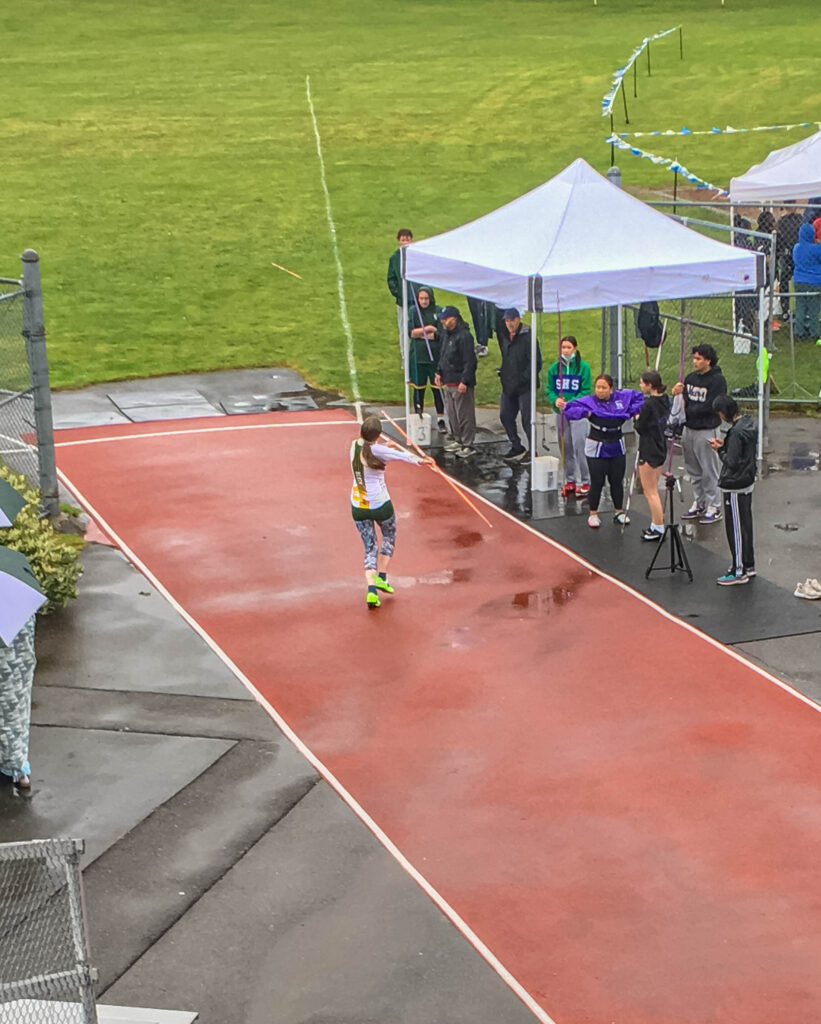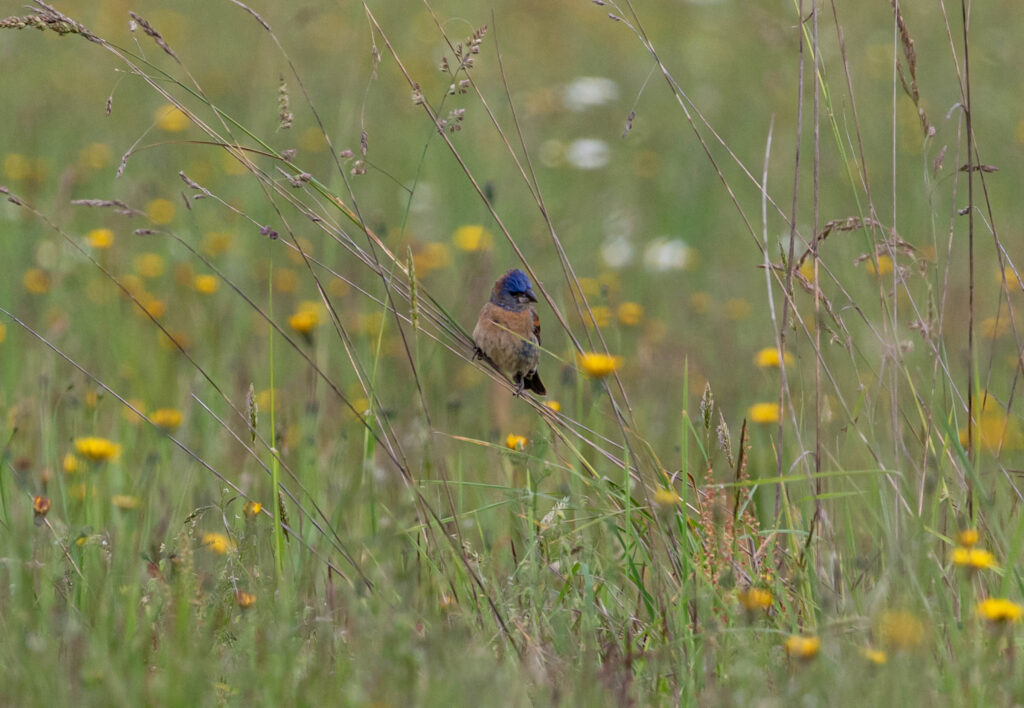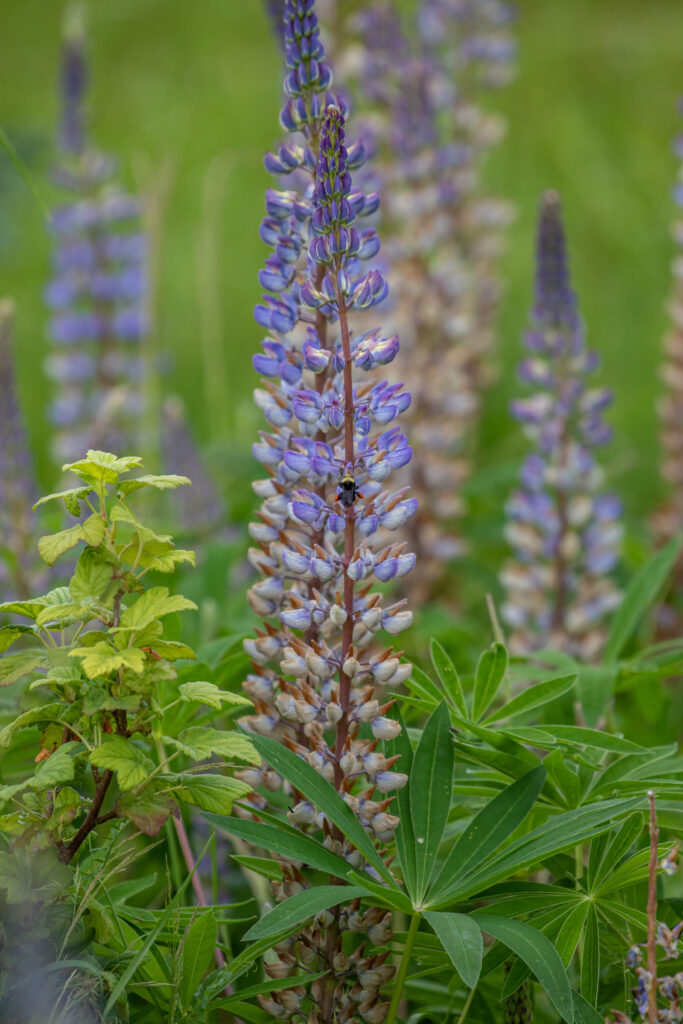On Father’s Day my husband, daughter, and I went on three different outings: disc golf, pickleball, and birding. All three are mild physical activities, done outside, and requiring different skillsets. They also provided me with a wonderful insight into how important it is to maintain a beginner’s mindset for optimal fun.

Disc Golf Reminded Me of the Beginner’s Mindset
We started with a “practice hole” at North Park, since our daughter had never played before. I wasn’t sure how my wrist would do. My first throw went perpendicular to the intended direction. I have zero control. I’ll have to throw leftie. Unfortunately, I pitched the next disc into the street. Mortified, I considered walking the tiny course as a spectator. Not once did I think, With my injured wrist, it’s like I am a complete novice. Better change strategies.
Meanwhile, my husband (who played a lot of golf and disc golf in the past) hit the chain basket in par 3. Mine took twelve. I used to be able to throw way harder and farther. Why bother? I can’t win; I can’t even compete. My wonky throwing will only slow us down.

Comparison Squashes Fun
Uh oh. You can see where this is headed. To quote Lost in Space, season 1 episode 10, “Danger, Will Robinson!” I fell prey to comparing, competing, and creating faulty expectations. When would a novice — injured at that — ever beat someone skilled? I was asking all the wrong questions. I’d fully succumbed to GAP thinking. (If this is new to you, please see previous posts about Dan Sullivan’s book, the Gap and the Gain.)
As my daughter linked her arm through mine and we returned to start the first hole “for real,” I quickly constructed a new narrative with different goals: be outside, share a new experience with my family, practice throwing straight, and improve from the previous hole.
For the next few holes, as my husband continued with par 3’s, I focused on my own efforts. When my score dropped from 12 to 8 and then 7, and I straightened out the disc’s flight path, I smiled. I was learning. I was improving. This was fun. When we left, I wanted to keep playing. We’d arrived in the Gain.

Pickleball and Lack of a Beginner’s Mindset
Second, we tried pickleball, something none of us had played before. I’d never even heard of it until a hiking buddy (CW!) and writing partner (AC!) both mentioned playing. My racquet experiences extended to squash, ping pong, badminton, and tennis, but the whiffle balls don’t bounce much and take some getting used to. We watched a two-minute video on the basics and set out to play with our brand-new equipment.
As with disc golf, I tried using both hands. This time, I could hit with the right, but each contact sent a zing up my wrist. Good rehab, I convinced myself. My husband played on one side, and my daughter and I teamed up on the other. Our only goal was to try it out, kind of like we hit the badminton birdie in our backyard with no net.

Competition Reduces the Joy
After we’d volleyed for a few minutes, laughing about the short racquets and balls that don’t bounce, a kind stranger approached and offered to teach us the rules. A fourth! Why not? Unfortunately, this meant fewer opportunities for each of us to hit, and that darn competition thing returned. My daughter got frustrated and left, while my husband and I stayed a few more minutes, hoping to pick up a few useful tips. “Dinking” turned competitive; fun morphed into work.
When we finally located our daughter hanging out by a stream, she said she’d be happy to try disc golf again, but not pickleball. At least not if we’re going to repeat what had just happened. The lesson, at least in our family: competing before you have mastered basic competencies reduces the joy.
Birding and Chasing a Rarity
Our final adventure of the day was to Marymoor Park in Redmond to try to spot a rare species, the blue grosbeak, which had only been seen north of Oregon three times in Ebird.org‘s recorded history. Birding is a solitary endeavour — you generally don’t want scores of people disturbing the birds you want to see — yet when there are rarities in the area, it can become quite a social event.

My husband is a Master Birder through Seattle Audubon. He also has countless hours of practice with a 500mm lens, taking photos of birds in flight. Here, I knew from the outset what my expectations were: Spot the blue grosbeak. Secondary? Get a photo. Hard enough since birds are wild and unpredictable.
I also knew there would be dozens of other birders with far more experience looking for the same bird. In this case, it would help me to get a glimpse. I simply went along for the ride to absorb whatever knowledge everyone else shared. The result? I enjoy birding with people who know a lot more than I do. While I can maintain a beginner’s mindset, I can also help teach any others who know less about it than I do. Win-win.
The Take-away Lessons
Today’s ramblings reminded me of four key points:
- For optimal fun, whimsy and play, maintain a beginner’s mindset
- Establish realistic expectations, as that leads to staying in the Gain
- Compete only with yourself, while you establish basic competencies, or risk squelching your joy
- Learning can be challenging. For optimal learning, cultivate a beginner’s mindset

If there is something you have wanted to try, explore it with a playful, childlike, and curious mindset. Find someone who can guide you in a gentle, non-competitive way. Give yourself permission to be a complete novice, without judgment or embarrassment. Share your experience in the blog comments. And as we approach Blog posts 45-50, if you have topics you would love to have me explore, please suggest them.


I have to admit that I am far from “a natural” when it comes to operating successfully with a beginner’s mindset. My typical experience when in a position to play with something new is not unlike what you described about trying your hand at Pickleball. As a result, and left to my own devices, I tend to stay away from “the unknown” and the “potentially awkward and frustrating”. I must thank IKEA for nudging me outside of my comfort zone when I get ready to assemble a newly purchased piece of furniture based on hieroglyphs only. However, I also know that learning and discovering bring great joy if only I can “do it right”. Once I stopped thinking about “do it right” in terms of “winning” and “performing”, it became easier to try and persevere at new things… a little easier. I decided that “Doing it right” was more about being open to the experiment, seeking the discovery more than the victory, and agreeing to be OK whatever the outcome: the TRYING is all that matters. One such example is my participation to a guided backpacking trip last year (in itself something I had never done before as I prefer solo ventures). The trip organizers offered the option to use “demo gear” for folks who did not have the necessary components, or who wanted to experiment with different options. I decided to take advantage of that offer and use a tarp and bivvy (instead of a tent), a quilt (instead of a sleeping bag), chemical water treatment (instead of filters), and an ultralight alcohol stove (instead of a gas canister and burner). I had to learn from others, I had to make a few mistakes, I had to be less comfortable than on other trips… but I returned understanding these alternate solutions, and adopting two of them for my solo trips. What made this experiment a success? I did not have much greater expectations than “try and do your best to learn, see what works and what does not”… and the organizers made the environment very “safe” and non-judgmental. Thank you for sharing your own experience at disc golf, pickleball, and birding… I feel less “embarrassed” thinking back to situations when my level of performance was more similar to yours at pickleball (golf comes to mind for me…) 😊
Thanks for your comment, Gerard. In particular, your comment: “I decided that “Doing it right” was more about being open to the experiment, seeking the discovery more than the victory, and agreeing to be OK whatever the outcome: the TRYING is all that matters” sounds like a wonderful reframing of your definition! The other way to frame it is Nelson Mandela’s quote, “I never lose. I either win or learn.” If we fear losing or looking embarrassed or failing, and can reframe the words we use (more on our language choice in upcoming blog posts!) using the beginner’s mindset (say, of a four-year-old) who is learning EVERYTHING and trying to figure out what he/she (oop, they) like, we can hold onto that open attitude of joy and excitement no matter what we are trying to learn. It’s a muscle we stopped using (many of us) after our youth but lucky for us, with mindfulness and concerted effort, we can rebuild and retrain. May this be a summer of joy and retraining!
Great article. The beginner’s mind set is useful in mountaineering and solo hiking. I used it all the time. In practicing these activities, too much confidence, may led to injuries. When I solo hike, I always remind myself to go slow and be present 100%. Overtime and with more experience, you can take more risk, which is necessary good for some activities. Starting new activities is always so much fun. Overtime doing the same activities can diminished the joy of it. I am lucking as hiking, and even more solo hiking, brings me so much fun. And I am still practicing it with a beginner’s mind. 🤩
Thanks, Silvie-Marie! The beginner’s mindset is useful for EVERYTHING. If we can keep a soft focus, playful attitude, and acceptance of mistakes as part of the process, no matter what stage we’re in, we can have a much better time with more fun, joy, AND progress. And as my husband pointed out (his questions one day helped me come up with this idea), if we DON’T have a beginner’s mindset we are at risk of NEVER learning ANYTHING.
Continued learning is one of our major family values, but this diametrically opposed dichotomy — the desire to learn and grow, but also the entirely false belief that I “should” already be able to do some things (like pickleball or disc golf, but it could also be singing, or writing, or throwing javelin just by watching my daughter) — has really crimped what I’m READY, ABLE and WILLING to even TRY.
Well, no more. Keep that beginner’s mindset in all you do, and keep having fun!
I love this!
So glad!! It’s been fun tracking my changes through my blog posts. Thinking of printing them all up in 2021-2022 “book” for myself complete with “best of” pictures. And you started it all! Take a bow!